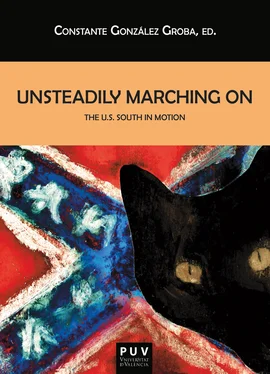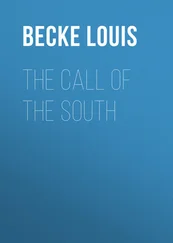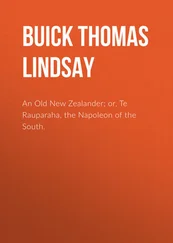In choosing the life of the road, however, Billy and John Grady lose the focus and grounding needed for them to grow fully into the sort of craftsmen exemplified by the doctor and the judge, men who use their skills for the good of their communities and of others. Billy’s and John Grady’s wanderings—seeking adventure, revenge, stolen goods—are not the travels of journeymen craftsmen. Ben in The Stonemason says that in building with stones he “begin[s] to live in the world” (96), but Billy and John Grady use their skills primarily to escape from the world and their responsibilities in it. Being grounded is at the heart of the advice of an old man who tells Billy in The Crossing that “he must cease his wanderings and make for himself some place in the world because to wander in this way would become for him a passion and by this passion he would become estranged from men and so ultimately from himself” (134). Indeed, wandering in McCarthy’s world always threatens to devolve into violence and mayhem, underscored so brutally in Blood Meridian , wherein the scalphunters ride ceaselessly, without direction and destination, slaughtering all whom they meet.
Perhaps the starkest contrast in McCarthy’s fiction between the knowledge of the craftsman and the mindlessness of the wanderer comes in A Child of God , when Lester Ballard takes an axe to a blacksmith for re-sharpening. Having lost his farm because of unpaid taxes, the displaced Ballard is on a downward spiral toward losing his humanity and becoming both a literal and a figurative caveman. Highlighting Ballard’s descent is the competence and goodness of the smith. After examining the axe, the smith ends up redressing it, explaining to Ballard lovingly and in detail each step of the complicated processes of firing, cooling, and hammering. “It’s like a lot of things,” the smith says. “Do the least part of it wrong and ye’d just as well to do it all wrong.” “Reckon you could do it now from watchin?” the smith then asks, to which the utterly oblivious Ballard, who has missed everything the smith has said and done, responds inanely, “Do what” (74).
While the basic opposition between craftsman and wanderer works consistently throughout McCarthy’s fiction, there are twists and complications. Most significant is the fact that craftsmanship by itself is not necessarily affirming; merely being skilled at a particular task does not guarantee that a person is filled with sweetness and light. Craftsmanship may foster charity and hope, but only if a person is open to such fostering; and there is always the danger that commitment to one’s craft will become so all-consuming that its life-affirming drive becomes just the opposite, a denial of all things human in the face of the demands of craft. Lester Ballard, for all his failings, for example, is something of a marksman, but he uses that skill only selfishly to win stuffed animals at a carnival sideshow and to add to his collection of dead people. Even those skilled workers who, unlike Ballard, do not wander but remain fixed in their communities, are not necessarily beneficent, as McCarthy suggests in his detailed description of the medical students’ dissection of Ballard’s corpse near the end of the novel: “He was laid out on a slab and flayed, eviscerated, dissected. His head was sawed open and the brains removed. His muscles were stripped from his bones. His heart was taken out. His entrails were hauled forth and delineated and the four young students who bent over him like those haruspices of old perhaps saw monsters worse to come in their configurations. At the end of three months when the class was closed Ballard was scraped from the table into a plastic bag and taken with others of his kind to a cemetery outside the city and there interred” (194).
Here, McCarthy indicates that at a fundamental level of practice there’s little difference between the sanctioned violence of the medical students and the illicit violence of Lester Ballard. The parallels between Ballard’s and the students’ handling of bodies are striking: both work underground, both lay out their bodies on pallets, and both follow strict rules of conduct. In all this, McCarthy implicitly suggests that the medical students, for all their intelligence and skill, are enmeshed in a social system that legitimizes its own injustices, a system not unlike that of the Mexican prison in All the Pretty Horses : “Underpinning all of it like the fiscal standard in commercial societies lay a bedrock of depravity and violence where in an egalitarian absolute every man was judged by a single standard and that was his readiness to kill” (182). These doctors in training are of course not literally killing people, but figuratively they are doing just that, taking bodies apart, unmaking them rather than making them. Returning to Ben’s words on college professors that I began with, we could say that with the medical students as of yet there is no thinking, no dialogue between head and hand. Perhaps one day these students will embrace the charity of caregiving as skilled physicians, like the doctor who tends to Boyd in The Crossing , but for now all they are creating are bags of slushy remains, detritus to be buried and forgotten. Even Lester Ballard treated his victims with more respect and love.
The medical students’ dismantling of Lester’s body in Child of God points to an idea that McCarthy would fully develop in his Western fiction: that standing fundamentally opposed to the makers, the craftsmen whose work and lives embody hope, charity, and goodness, are the unmakers, those who annihilate everything that stands in their way, not only people but also the principles of order and belief by which people and communities traditionally live. The two most powerful of these destructive unmakers are the judge in Blood Meridian and Chigurh in No Country for Old Men.
Throughout Blood Meridian , the judge is a prophet—and a craftsman—of war, preaching and wreaking destruction. As a craftsman, he creates weapons for efficient killing, at one point carefully concocting gunpowder from a mixture of bat guano, charcoal, brimstone, and urine. The band of scalp hunters itself is a powerful weapon largely of the judge’s making: though not mustered by the judge, his leadership and guidance mold it into a cohesive, efficient killing machine. Once a rag-tag group of marauders, the raiders under the judge’s sway are soon riding out “like men invested with a purpose whose origins were antecedent to them, like blood legatees of an order both imperative and remote. For although each man among them was discrete unto himself, conjoined they made a thing that had not been before and in that communal soul were wastes hardly reckonable more than those whited regions of old maps where monsters do live and where there is nothing other of the known world save conjectural winds” (152). Waste, destruction, and blood lie in their wake. Using the language of the stonemason (his mirrored opposite), the judge later characterizes the group’s bonding by observing, “Is not blood the tempering agent in the mortar which bonds?” (329). This is not the blood of kinship but the blood of slaughter.
Much of what the judge preaches to the scalp hunters focuses on war, the ultimate act of destruction and unmaking. Significantly, the judge often speaks of war in terms of stone, suggesting that war is the reverse image of masonry, a demonic making that unmakes the world of God’s—and man’s—creation. Masonry’s connection with the divine gets its fullest expression in The Stonemason , when Ben observes that “true masonry is not held together by cement but by gravity. That is to say, by the warp of the world. By the stuff of creation itself. The keystone that locks the arch is pressed in place by the thumb of God” (9-10). Ben goes on to observe that “according to the gospel of the true mason God has laid the stones in the earth for men to use and he has laid them in their bedding planes to show the mason how his own work must go. A wall is made the same way the world is made. A house, a temple. This gospel must accommodate every inquiry. The structure of the world is such as to favor the prosperity of men. Without this belief nothing is possible. What we are at arms against are those philosophies that claim the fortuitous in mens’ inventions. For we invent nothing but what God has put to hand” (10).
Читать дальше












